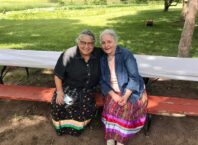Some faculty members within the
University of Minnesota’s Department of American Indian Studies are
trying to preserve two languages indigenous to the state.
Currently, students don’t have the
option to major in Ojibwe or Dakota, the two languages offered within
the department. But with a recent push from veteran and new
professors, students may eventually be able to major in the
languages.
Brendan Fairbanks, a long-serving
assistant American Indian studies professor, said creating the option
to major in each of the languages would allow students studying the
languages to receive better jobs after graduation and would ensure
the languages stay alive.
If the languages remain used, she said
students who know them “can go on to teach their children the
language.”
University students can currently
receive teaching certificates – named the Dakota Iapi
Unspewicakiyapi and the Ojibwemodaa Eta! certificates – that allow
them to teach the languages at immersion schools.
Still, some say the creation of new
major programs for the languages could be beneficial.
Michelle Goose, who’s entering her
first year in the department as a teaching specialist, said making
the languages into their own separate majors is important so that
students can make good use of what they learn.
“We need to make the language more
relevant to students,” she said. “We need to make it something
they can use in their daily lives.”
Professors in the department hope
developing the language track into two new majors will make the
program more appealing to prospective students.
Because there isn’t a large demand
for Dakota and Ojibwe immersion school teachers in the state, the job
market is highly competitive, said former University student Liz
Cates, who received her Dakota teaching certificate last spring.
Though she currently works as a
teacher at a local immersion school, Cates said entering the job
force with a degree in Dakota would have been helpful when she was
searching for jobs.
Cates also said that having specific
majors for the languages will help preserve them and allow
instructors to better teach them to elementary students in immersion
schools.
“The more Dakota and Ojibwe students
who can major in their languages, the more able they are to bring
their gifts of speaking and teaching the language back to our
communities,” she said.
The process of creating the majors is
still in the early stages, department chair Jean O’Brien said,
though faculty members have big plans for the languages.
“We have a real need for
revitalization of the language as well as making sure it gets taught
in every context it needs to be at the higher level,” O’Brien
said.
According to the American Indian
studies department’s website, there was estimated to be only about
678 first-language speakers of the Ojibwe language and eight
first-language speakers of the Dakota language within those
communities in Minnesota in 2009.
Because of the sharp decline in people
who speak the languages, Cates said it’s important to keep the
languages alive.
“Any step that can be made to
increase accessibility and intensify language learning should be made
without hesitation, as time is running out,” Cates said.






